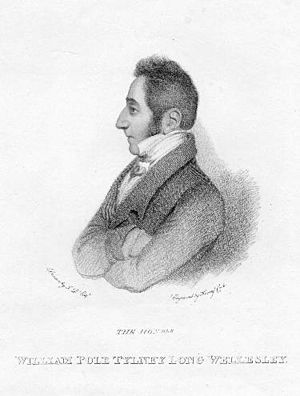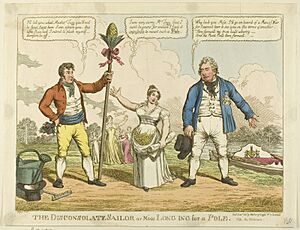William Pole-Tylney-Long-Wellesley, 4th Earl of Mornington facts for kids
Quick facts for kids
The Earl of Mornington
|
|
|---|---|

William Pole-Tylney-Long-Wellesley, c. 1812
|
|
| Member of Parliament for Essex | |
| In office 1831–1832 |
|
| Member of Parliament for St Ives | |
| In office 1830–1831 |
|
| Member of Parliament for Wiltshire | |
| In office 1818–1820 |
|
| Member of Parliament for St Ives | |
| In office 1812–1818 |
|
| Personal details | |
| Born |
William Wesley-Pole
22 June 1788 London, Great Britain |
| Died | 1 July 1857 (aged 69) Thayer Street, Manchester Square, London, UK |
| Political party | Tory/Ultra-Tory |
| Spouses |
Catherine Tylney Long
(m. 1812; died 1825)Helena Paterson Bligh
(m. 1828) |
| Profession | Politician |
William Pole-Tylney-Long-Wellesley, 4th Earl of Mornington (born June 22, 1788 – died July 1, 1857) was an Anglo-Irish nobleman and politician. He was known for his eventful life and his time as a Member of Parliament (MP) in the United Kingdom.
Contents
Early Life and First Marriage
William Wesley-Pole was born in London on June 22, 1788. His family later changed their last name to 'Wellesley' in the early 1790s.
On March 14, 1812, William married Catherine Tylney-Long. She was known in London society as "The Wiltshire Heiress" and was believed to be the wealthiest commoner in England. Just two months before their wedding, William added the surnames Tylney-Long to his name through a special permission called a Royal Licence.
During this time, William also began a career in politics. He served as a Tory MP for St Ives from 1812 to 1818. He then represented Wiltshire, where his wife's family had a lot of influence.
William was known for spending a lot of money and enjoying a grand lifestyle. In 1814, he hosted a huge party at Wanstead House and its gardens. This event celebrated his uncle, the Duke of Wellington's, victory over Napoleon. Important guests attended, including the Prince Regent and over a thousand other important people.
He was friends with the Irish poet Thomas Moore and the famous poet Lord Byron. As his debts grew, he was given a special job as a Gentleman Usher to King George IV on August 8, 1822. This job gave him special protection from being arrested for debts. However, he soon left England because of his financial problems.
Second Marriage and Family Matters
While in Europe to avoid people he owed money to, William started a relationship with Helena Paterson Bligh. She was the wife of Captain Thomas Bligh. William eventually left Catherine, who passed away two years later on September 12, 1825. William married Helena in 1828, but this marriage also faced many difficulties.
William had trouble managing his money. He could not invest wisely in his first wife's property, nor could he sell it. He only had a "life interest" in it, meaning he could use the income from it but not the property itself. To pay off some of his large debts, he arranged for parts of Wanstead House's estate to be taken apart and sold.
He returned to Parliament in 1830, again as an MP for St Ives. He was one of the Tories who disagreed with his uncle's government. This disagreement led to the government's fall on November 15, 1830. He was then elected as an MP for Essex (where Wanstead was located) from 1831 to 1832.
After Catherine's death, William tried to get back control of his children. They were being cared for by Catherine's two unmarried sisters, Dorothy and Emma. He was especially interested in his eldest son, William, who had inherited Catherine's fortune. His uncle, the Duke of Wellington, stepped in to help the children stay with their aunts and away from their father.
A court called the Court of Chancery decided that William could not have custody of his children. In July 1831, he was sent to the Fleet prison for not obeying the court's orders. William tried to use his parliamentary privilege (a special protection for MPs), but the House of Commons committee rejected his request. For some time, he was often in court dealing with legal issues related to his efforts to gain custody of his children.
Later Years and Passing
William lived a challenging life and spent some time in Brussels to avoid his creditors. In his final years, he lived on a small allowance of £10 a week provided by his cousin, Arthur Wellesley, 2nd Duke of Wellington. From 1842, he was known as Viscount Wellesley. In 1845, he became the Earl of Mornington after his father passed away.
He died in London on July 1, 1857, at the age of 69, due to heart disease. He was buried in Catacomb B at Kensal Green Cemetery in London.
Images for kids
 | Lonnie Johnson |
 | Granville Woods |
 | Lewis Howard Latimer |
 | James West |



